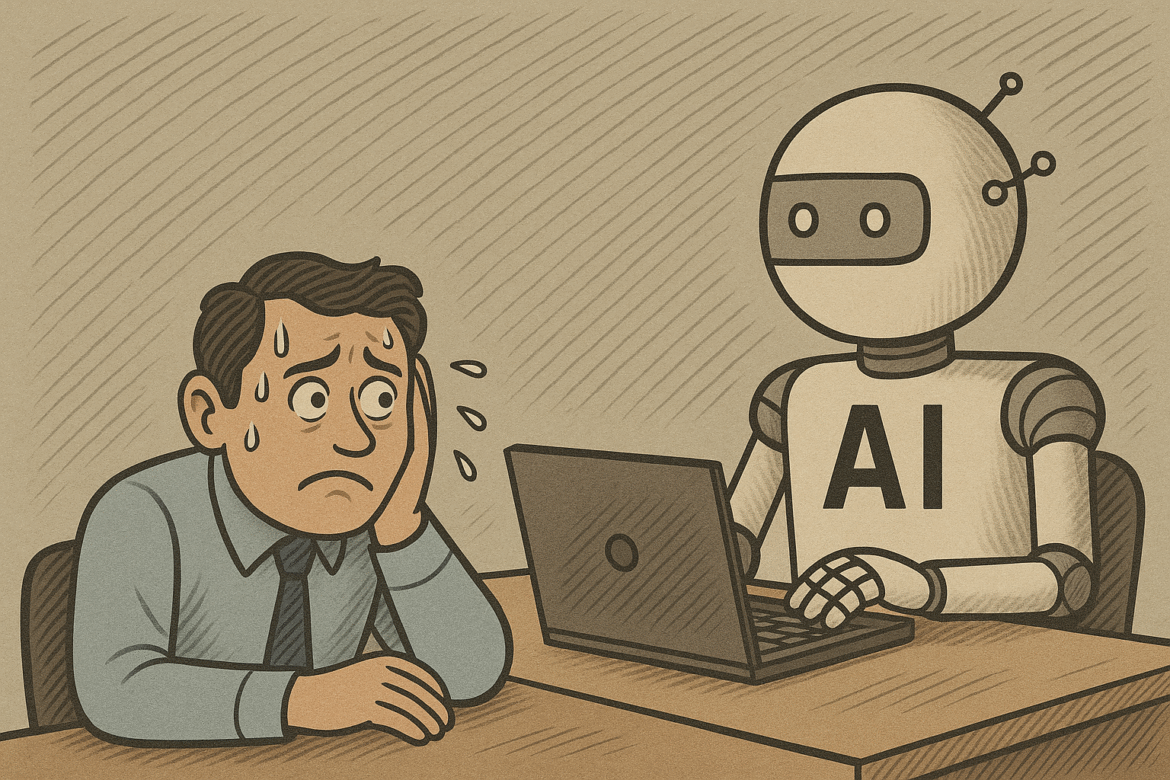By Nitin Deckha, University of Guelph-Humber
We live in a time of growing anxiety and fear, where the disruptive forces of artificial intelligence (AI), automation, Big Data, virtual reality and augmented reality loom ominously over people’s lives.
In a recent Scientific American article, psychologist Mary Alvord described how these anxieties are manifesting in her clients. Their concerns ranged from the increase in students cheating with generative AI to the erosion of online data privacy, to more existential fears of job loss and even the “possibility of overall human obsolescence.”
These aren’t abstract concerns. Beyond the psychologist’s chair, the concern over the loss and transformation of work by generative AI is well-founded and widely documented by academic research studies and reports. As AI becomes more capable and embedded in daily routines, anxieties surrounding it are likely to intensify.
The future of work
The World Economic Forum’s (WEF) 2025 Future of Jobs Report found that 85.7 per cent of employers surveyed see AI, information processing, Big Data, virtual reality and augmented reality as the biggest technological driver of business transformation. Robots and automation follow at 57.8 per cent.
While the report notes that long-term productivity gains from these technologies remain uncertain, it found that certain jobs are being impacted more than others. Roles where generative AI can mimic human capacities — like data entry, administration, legal and executive secretaries, claim adjusters and examiners, and graphic designers — are declining the fastest.
These findings are corroborated by a recent joint report from the International Labour Organization (ILO) and Poland’s National Research Institute. It found that 25 per cent of jobs are at risk of being changed by generative AI, a number that jumps to 34 per cent in higher-income countries.
The report also noted a gendered impact: in high-income countries, 9.6 per cent of jobs held by women are at high risk of automation, compared to just 3.5 per cent of jobs held by men.
The impact on clerical jobs noted by the WEF is supported by ILO’s data as well. Joining these roles are what the ILO describes as “highly digitized cognitive jobs in media, software, and finance-related” fields.
The significant exposure of jobs such as securities and finance dealers and brokers, software developers, financial advisers, authors and writers, translators, interpreters and journalists underscores the encroachment of generative AI onto all sorts of “thinking” and creative work.
It is no wonder psychologists like Alvord suggest some humans are questioning what role they will have in the future world of work.
Work in a time of disruption
The COVID-19 pandemic and its impact on work — including the “great resignation” which saw record numbers of employees quitting their jobs — encouraged workers to reflect on their relationship to work.
Although workplace trends like remote work, flexible hours and employees re-evaluating their job expectations were already underway before the pandemic, COVID-19 accelerated these shifts.
According to futurists at Policy Horizons Canada, there are a number of “game changers” transforming the future of work. Disruptive technologies like generative AI and automation are just one driver.
Another major force is the fraying of the social contract between employers and employees. This shift speaks to larger currents of anxiety, fear and employee disengagement and low morale. Put simply, employers and employees are no longer investing in each other as much as before.
With the erosion of benefits, the rise of the gig economy and the increasing cost of living, employees were already feeling vulnerable and anxious about their work before the launch of ChatGPT in 2023.
How can we cope with AI anxiety?
As with any form of anxiety, it’s important to acknowledge your feelings and take steps to avoid becoming overwhelmed.
Psychologists suggest several specific strategies for managing anxiety about generative AI. These include: trying out AI tools to figure out how and where they can be useful; taking breaks from technology to restore and revitalize; building new skills; and pursuing activities that activate human creativity and imagination.
I would like to expand on the third strategy — building new skills. In a recent research study, my colleagues and I investigated the skills that are required to succeed in the future of work. We reviewed six research studies from around the world and created a skills inventory of future of work skills.
We identified 10 skills that were most frequently identified as key for the future of work: collaboration, communication, creativity and innovation, critical thinking, cross-cultural competency, decision-making and judgment, learning/willingness to learn, problem-solving and social intelligence/perceptiveness.
For those concerned about remaining employable in the face of AI disruption, focusing on these skills is a practical starting point, as they are likely to remain in demand as workplaces evolve.
Importantly, all these skills are “human” skills, meaning not digital or technological. In this context, perhaps one of the most effective responses to anxiety about AI is focusing on developing our own human capacities.
Rethinking our relationship with AI and work
Researchers argue that the disruptive potential of AI in the workplace involves one of three channels: replacing aspects of human work; complementing or augmenting human workers and their skills; and creating new tasks for workers.
Of these, the second — complementing or augmenting human work — might be the best path forward. Rather than viewing generative AI solely as a threat, it can be seen as a tool that enhances human abilities.
Exploring how our own cognitive and creative capacities could be augmented through “collaborative intelligence” with generative AI, might be a useful antidote to being anxious about it.
Such collaboration may also catalyze our re-imagining of our relationship to work and enhance our sense of purpose in a rapidly changing world.
Nitin Deckha, Lecturer in Justice Studies, Early Childhood Studies, Community and Social Services and Electives, University of Guelph-Humber
This article is republished from The Conversation under a Creative Commons license. Read the original article.





